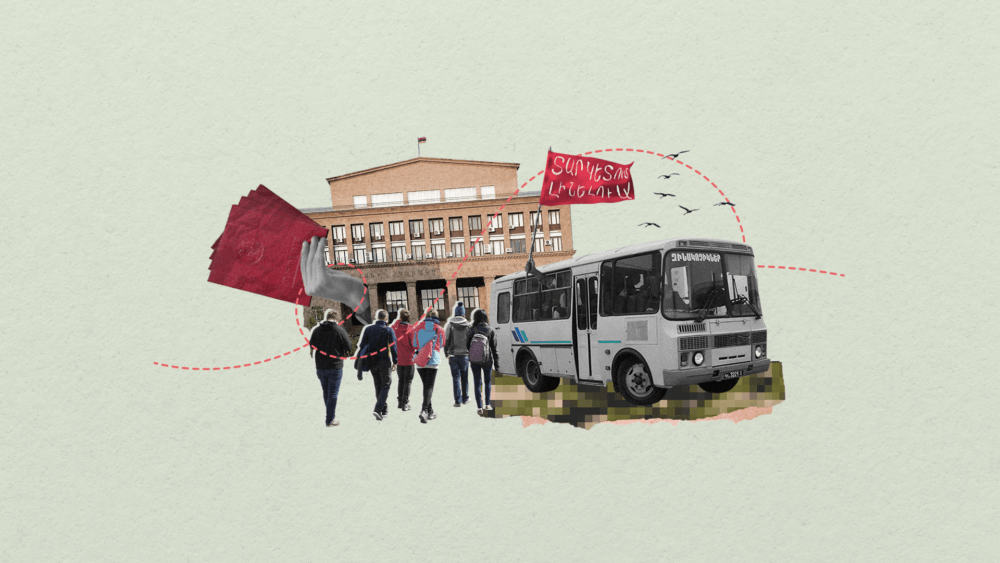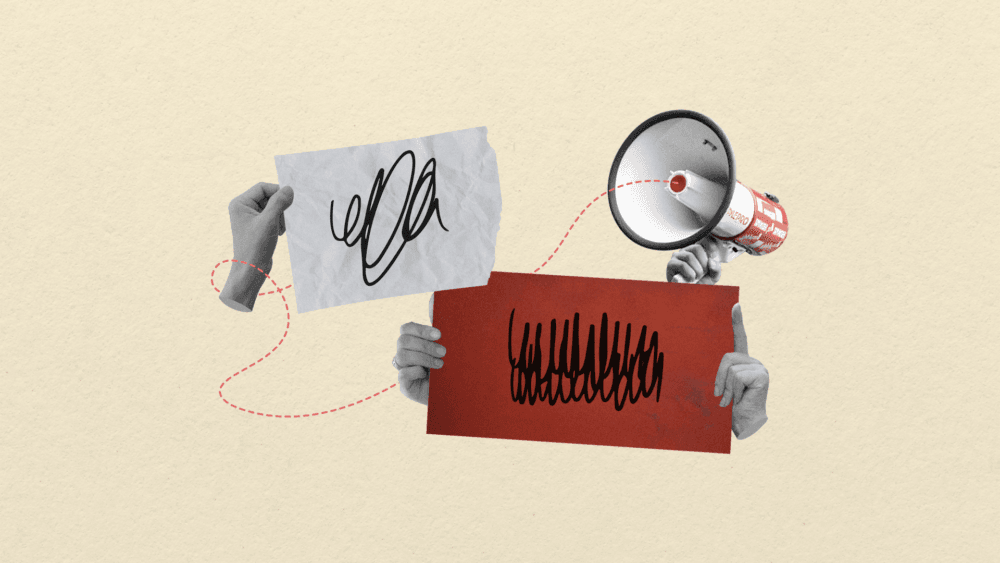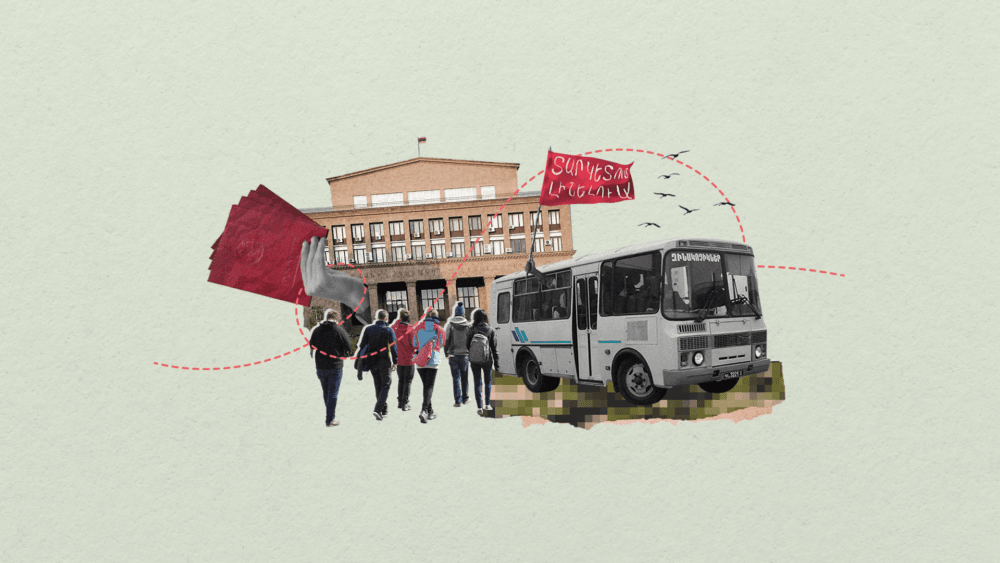
“In the army, education is the last thing on your mind. After coming back, all my plans disappeared, as if I had to start all over again,” said Samvel.
During our university studies, new male students joined our course every semester, while others left to fulfill their mandatory military service. Some of them later returned to the university, while others did not. Later on, when I didn’t see my former classmates in the corridors of the university, library, or public events, I assumed that they had terminated their studies. The curiosity about what made them quit university led us to talk with students who had different experiences.
“If I hadn’t gone to the army, I would have completed my university education. I’m not sure if I would have pursued a career in that field. Still, I would have definitely finished my studies,” says Samvel Stepanyan, 23, who received a fully funded scholarship to the Moscow State Institute of Electronics and Mathematics at the age of 16. After studying there for a year and a half, he returned to Armenia to fulfill his mandatory military service.
Upon returning from the army, he continued his education online at a Moscow university for six months and eventually dropped out. He says after the army he was exhausted and disappointed. Months after dropping out he applied and was accepted to Yerevan State University, but he is considering dropping out again due to already working in logistics and being unable to attend university classes and adapt to university life. “It was hard to go back to university,” he said.
In Armenia, mandatory military service is required for male citizens aged 18 to 27 years old. The standard length of service is two years, with certain exceptions for specific professions and education levels.
In the fall of 2017, a protest movement began in front of Yerevan State University. The student movement known as “There Will Be Deferment” gained significant attention and support from society. The reason behind this movement was the proposed amendment to the Law on Military Service and the Status of Servicemen, put forward by the then Minister of Defense. The amendment introduced changes to the process of obtaining deferments for male students, making it more complicated and reducing the number of beneficiaries.
This change in the law was part of the “Nation-Army” concept introduced during the final years of Serzh Sargsyan’s government. The concept emphasizes the collective responsibility of the entire nation for the defense and security of the country. It emerged following the 4-day war in April 2016.
“The main disagreement with the law stemmed from the belief that students’ right to maintain their educational continuity should not be violated, particularly on such grounds,” said Garik Miskaryan, who was among the active students involved in the protests at YSU.
The government claimed that the new law would stop boys from avoiding the army using education as a reason. According to the protesting students, the number of students who continued their education using the deferment option does not exceed 150. Thus, the introduction of the new law was unlikely to significantly increase the number of individuals serving in the army.
According to this law, students who want to obtain their bachelor’s degree before army service are required to sign a contract with the Ministry of Defense committing to serve in the army for three years after they graduate, instead of the initial two years. In return, the state covers their tuition fees. Otherwise, upon reaching the age of 18, they will be conscripted to the army for two years.
While compulsory military service can disrupt the education of young men, the Armenian government has implemented policies to address this issue. For instance, a system has been established that allows students to defer their military service until they complete their education.
Aren Ghulijanyan, who graduated from the National Polytechnic University of Armenia, started studying there in 2016. Because he exceeded the required score, he was granted free admission and given a four-year deferment. This happened before the new deferment law was passed in 2018, which allowed students to receive a deferment if they obtained excellent scores in their university admission exams and studied for free. After graduating from university in 2020, he did not apply for a master’s degree, as he did not see himself in science at that point and was dissatisfied with the quality of education.
“You never know what turns life might have, that’s why I wanted to finish my service in the army just in case, so if tomorrow the situation in Armenia turns out to be a bit difficult financially and economically I will have no problem getting a job in the government agencies,” said Aren.
In the Republic of Armenia, individuals who seek employment in some law enforcement agencies such as the National Security Service, Armed Forces, or the Police are required to provide official documentation validating their military service or any relevant documents indicating their discharge from the armed forces.
On the other hand, Aren believes that going to the army after studying at the university helps you to deal with day-to-day problems more maturely, and to be more attentive to security issues.
The Ministry of Education, Science, Culture, and Sport says a total of 1,075 individuals were granted deferment from compulsory military service based on government decision No. 451 of April 12, 2018.
The revised legislation stipulates that the process of granting deferment from compulsory military service is determined by an advisory body attached to the education minister.
Nver Kostanyan completed all the prescribed procedures established by the ministry and was granted a deferment to pursue his bachelor’s and master’s degrees at Yerevan State University.
“The first deferment I received predates the change in legislation. I was among the last group to be granted an automatic deferment upon university admission for free.” explains Nver.
Although he benefited from the law amendment, enabling him to maintain educational continuity, he acknowledges that this opportunity may still be inaccessible to many others. He highlights the significant disparity in the number of female students involved in higher education and pursuing master’s degrees compared to their male counterparts. Nver argues that compulsory military service inherently hinders boys’ educational progression, negatively impacting their academic pursuits.
The exact number of students who do not continue their education after completing their military service remains unknown.
Data collected by Yerevan State University reveals that between 2012 and 2017, before the change in legislation, a total of 136 male citizens didn’t continue their university education after the army. In the period from 2017 to 2023, the cumulative number rose to 1,013.
Illustrations by Aram Karajayan


